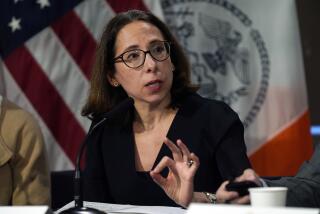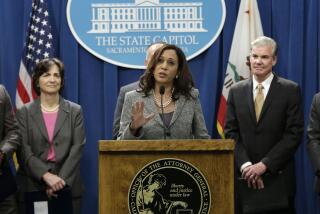U.S. attorney firings open new doors for the 9
WASHINGTON — Daniel Bogden had just settled back into his office in Las Vegas early last December after a trip to Washington where he and dozens of other U.S. attorneys attended a conference at the Justice Department on protecting children from crime.
It had been an upbeat occasion. The department’s No. 2 official gave a rousing speech during a closed-door session in which he praised members of the group as among the finest and most able U.S. attorneys in the department’s storied history.
Three days later, on Dec. 7, Bogden and six other of those attorneys received phone calls from a top Justice official in Washington. They were told they were being fired.
“I thought it was some kind of bad joke,” said Bogden, who had been the top federal law enforcement official in Nevada for five years. “I was waiting for the punch line that never came.”
The politically charged firings of one year ago spawned a scandal that helped lead to the resignation of an attorney general and cast a pall over the Justice Department. The prosecutors -- nine altogether, including two fired earlier in the year -- were thrust into new lives and careers under circumstances they could never have imagined.
Called to account for the firings, the department brass branded them insubordinates or underachievers, even though they had scored well in department performance reviews.
The attorneys’ own testimony -- and ties to voting-rights and corruption cases that some influential Republicans found objectionable -- suggested the possibility of other, more political motives. But speaking out was perceived as disloyal in some quarters.
A year later, most have landed on their feet, in law partnerships or private-sector jobs where their compensation dwarfs government pay. Some carry scars from the experience. Six of the attorneys marked the anniversary of their firings at a private dinner in San Diego 10 days ago, where they toasted one another for persevering.
“The great irony of this is, it has hardly tarnished any of our reputations,” said Paul Charlton, the former U.S. attorney in Phoenix, who hosted the reunion.
Charlton, now a partner in a Phoenix law firm, says that as a group, the attorneys have fared much better than the department officials who orchestrated their demise.
Several of those officials, including former Atty. Gen. Alberto R. Gonzales, have hired lawyers to defend themselves in connection with a wide-ranging departmental investigation.
Several of the fired attorneys have been honored by bar groups for blowing the whistle and helping expose the scandal.
John McKay, the former U.S. attorney in Seattle, got an award from the Washington state bar for displaying “exceptional courage in the face of adversity” and “bringing credit to the legal profession.” He is now a professor at Seattle University law school, where he has written a law- review article that makes a case for bringing criminal charges against Gonzales and other officials on suspicion of lying to Congress and the public about the firings.
The notoriety associated with the firings “opened doors,” said H.E. “Bud” Cummins, the former U.S. attorney in Little Rock, Ark.
Cummins, who worked in his family’s construction business in Oklahoma before going to law school, has taken a job helping build a biofuel refinery in Nebraska to produce energy from soybeans. He says he may end up back in law after the expiration of conflict of interest rules that limit former prosecutors’ contacts with their old offices.
Though they see themselves as vindicated, some of the prosecutors who were fired are embittered about the circumstances of their public-service careers being cut short. The position of U.S. attorney has often been a springboard to elected office or to the federal bench.
“It altered the trajectory of my life,” said David C. Iglesias, the former U.S. attorney in Albuquerque. “I really thought I was going to continue in public service and run for elected office here in New Mexico. That is not going to happen.”
Republican Party leaders, he said, “view me as a Benedict Arnold” for speaking up about the affair. “They think I should have gone away quietly.”
Iglesias is performing consulting work on law enforcement issues in the Albuquerque office of Booz Allen Hamilton and is writing a book about the scandal titled “In Justice,” to be released next year.
Margaret Chiara, the former U.S. attorney in Grand Rapids, Mich., is the only member of the group still working in government. Since September, she has worked for a small congressionally chartered commission in Washington studying the problem of rape in federal prisons.
She said that the publicity surrounding the firings made it difficult to find work and that she spent six months circulating her resume for government jobs across the country before she landed one she found acceptable.
The “improvident choice of explanations given” by department officials about her dismissal compounded the search, she said. She said she chafed at “the irony of receiving outstanding evaluations, and then being labeled a poor manager” and saw a backlash for speaking out.
“I was, perhaps, and still am a political pariah,” she said in an interview. “We were prepared to say nothing. . . . It was only when false explanations were pronounced by members of the department that it became necessary to respond.”
Carol C. Lam, who was the top prosecutor in San Diego, is senior vice president and legal counsel with Qualcomm Inc. A former assistant U.S. attorney and state judge, Lam said she had always planned on doing “something different” from criminal law after leaving the U.S. attorney position -- though she had to make that decision sooner than she would have preferred. She believes the firings demonstrated a lack of understanding and respect in the Justice Department for a U.S. attorney’s job.
But Lam said the mass firings did bring some positive changes, focusing attention on some of the other worsening problems at the department, such as widespread and dubious hiring practices.
She remains deeply concerned about the effect of what appeared to be long-term plans to fill career positions in the department with political appointees.
“That is going to take a long time to fix,” she said in an interview. “It calls into question not only who was hired, but who should have been hired but wasn’t.”
Todd Graves, the former U.S. attorney in Kansas City, Mo., has started his own law firm. His firm’s work includes advocacy for a number of conservative political action groups.
“I don’t know if it helps me or hurts me, and I don’t spend a lot of time thinking about it,” Graves said in an interview. He noted that he was fired earlier in 2006 than the other U.S. attorneys, a fact that did not become public until after he had launched his new venture. “By that time, my practice was moving along at a pretty good clip.”
Kevin Ryan, who was U.S. attorney in San Francisco, has joined a firm in that city and he is building a specialty in sports law. “Yesterday’s over, so can’t look back too long, just too much to see in front of me,” he said in an e-mail, paraphrasing songwriter Jimmy Buffett.
Bogden said he had been so focused on his job that he never gave much thought to what he would do after leaving government.
He had been a state or federal prosecutor for his entire professional life.
The thought had occurred to him that if a Republican president were elected in 2008, he might be asked to stay on for another term as U.S. attorney.
In October he joined a prominent Nevada law firm. The idea of billable hours and having paying clients, he acknowledges, is a strange new world.
“It is just a lot different than what I grew accustomed to,” he said.
“I am going to keep all my options open. Right now this is very, very challenging. I am on this very, very steep learning curve.”
More to Read
Sign up for Essential California
The most important California stories and recommendations in your inbox every morning.
You may occasionally receive promotional content from the Los Angeles Times.










